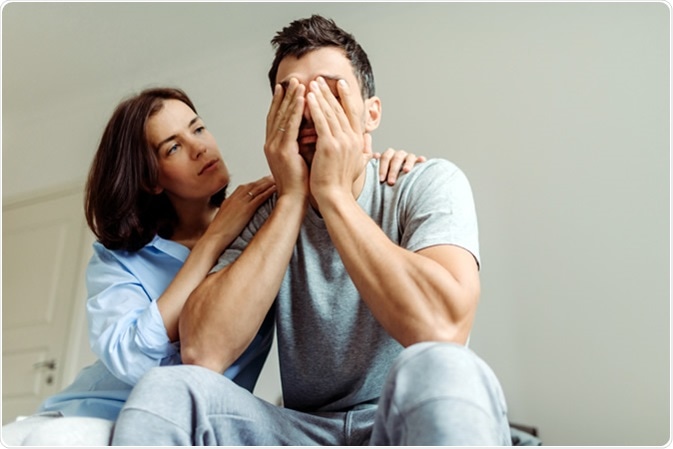
Situational Depression: Symptoms, Causes, Treatments
Skip to:
- What is Situational Depression?
- What are the Symptoms of Situational Depression?
- The Difference Between Situational Depression and Grief
- Treatments for Situational Depression
- Effects of Grief on the Body
Situational depression (also known as reactive depression) is a specific type of depression, which is a mood disorder that is complex both in its causes and its symptoms.
The symptoms of situational depression are very similar to those seen in grief, and it is important to be able to distinguish between the two so that appropriate treatment and support can be found.

Image Credit: VK Studio / Shutterstock
What is Situational Depression?
Situational usually lasts several months. It is brought on by a specific situation or event, such as:
- The loss of a job (whether it be through redundancy, retirement, or being fired)
- A traumatic injury (for instance sustained from a car accident, assault, or during combat)
- Natural disasters
- Living in a dangerous area
- Rejection
- Financial problems
- The end of a relationship
- The death of a loved one
However, any event that an individual finds stressful can trigger situational depression. Symptoms will usually develop within 90 days of the stressful or traumatic event.
Situational depression is differentiated from other types of depression in that episodes generally only last a few months, whereas episodes of other types of depression can affect people for years or a lifetime.
The months that a person is affected by situational depression can be very difficult, and the depression they experience can be severe. It is not any less ‘real’ than clinical depression because its duration is shorter.
As with any kind of depression, what may trigger situational depression in one person will not always be the same in another, as people naturally deal with and react to stressful or traumatic events in different ways.
People can be more susceptible to situational depression if they already have a mental health condition or if they have had a stressful or traumatic childhood.
Another important distinction to make between situational depression and other types of depression is that situational depression is directly linked to a traumatic event.
Other types of depression can develop in people who have not been through traumatic events, periods of intense stress, and who are generally happy, and some cases of depression are put down to biological causes such as dips in certain hormones, or a biological pre-disposition to the condition through their family history.
What are the Symptoms of Situational Depression?
The symptoms of clinical depression are complex and can differ from person to person.
Symptoms include:
- Feelings of persistent hopelessness and sadness
- Feeling tearful
- Anxiety
- Irritability
- Fatigue
- Weight loss (sometimes weight can increase as well)
- Headaches
- Problems with digestion
- Loss of interest in hobbies
- Low self-esteem
- No motivation
- Problems with decision making
- Loss of libido
- Changes to the menstrual cycle in women
- Suicidal thoughts or desires to self-harm in severe cases.
The symptoms are very similar to the symptoms seen in grief, but situational depression is a distinct condition.
The Difference Between Situational Depression and Grief
Grief is a natural response to loss. Depression is a psychological illness or mood disorder.
Grief is often described as a process, and although people will move through the stages of grief at different rates, the progression will still occur.
These stages are generally defined as below.
- Accepting that your loss is real
- Experiencing the pain and grief
- Adjusting to life without the person who has passed away
- Putting less emotional energy into the grieving process and moving on.
Grief triggers a range of emotions, including:
- Shock and numbness - often in direct relation to the death
- Intense sadness and frequent crying
- Fatigue and exhaustion
- Anger - sometimes towards the person who has passed away, their cause of death, or even religious figures
- Guilt – often about things a person did or didn’t say to someone before they died, about not being able to stop someone from dying, and about grieving itself.
Although there are a lot of intense, negative emotions in the grieving process, people who are grieving can find happiness in life and enjoy the things they love to do, whereas people with depression will struggle to find enjoyment in anything they do.
Bereavement counselling, hospices, and talking therapies can help support a person through the grieving process, and help them to deal with their loss and move on naturally in safe and appropriate ways.
If negative feelings begin to make a person feel as though they can’t cope, or they are causing someone to neglect work, school, or family life, or lose interest in living life altogether, and especially if these feelings last for a very long time, it is essential that they seek help.
Treatments for Situational Depression
Talking therapy can be effective in supporting a person through episodes of situational depression. As the condition is linked to a specific life event, the methods to improve symptoms by teaching the patient to appropriately deal with stress and low mood can be identified relatively easily.
Support in sleep and stress management through talking therapy can help a person recover from situational depression.
Other methods of improving the symptoms of situational depression include:
- Regular exercise
- Eating a healthy diet
- Sleeping regularly
- Talking to and connecting with friends and family
- Joining support groups
- Taking up a new hobby, or engaging with an existing interest.
Sometimes antidepressants or anti-anxiety medication may be prescribed to people living with severe situational depression. These may be given in conjunction with talking therapy for a short period of time.
Although situational depression may only last a few months, it is still important that treatment is sought during this time.
However, the lack of motivation, feelings of hopelessness and low mood can stop people from seeking appropriate care. Loved ones should help and support someone going through situational depression by seeking the right care with or for them if they feel they cannot do it by themselves.
Effects of Grief on the Body
Grief does not only present with psychological symptoms. As with depression, there are a range of physical symptoms someone can experience while grieving.
Physical symptoms can include:
- Hollowness in the stomach
- Tightness in the chest or throat
- Sensitivity to loud noises
- Breathing difficulties
- Fatigue and weakness
- Dry mouth
- General aches and pains.
Seek medical advice if any of these symptoms become worrying.
It is important to seek help from healthcare professionals or friends and family during episodes of depression or if you are grieving.
Sources
Further Reading
Last Updated: Sep 16, 2019

































No hay comentarios:
Publicar un comentario